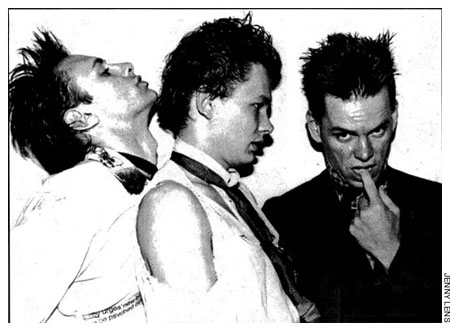BAM Magazine, May 5, 1978.
| The Screamers:
Mutant Offspring of the New Wave By Bob Taylor The Screamers roots stem a few years back to when lead vocalist Tomata Du Plenty and synthesizer player Tommy Gear met in a Seattle public lavatory Together they formed the marginally successful Tupperwares, backed by a transient personnel usually consisting of young garage band veterans. Seattle not being the most strategic location for career advancement, the undaunted duo migrated to Hollywood: there Gear discovered drummer K.K. at a party. "He had a lot of pent-up aggression," Tomata says. "I could tell by the way he was elbowing people and sort of pushing and shoving. It was a good indication to me that he had a good potential as a drummer. His crowd behavior was his audition." Together they shared the philosophy that conventional music is a "set kit that you take parts from and assemble"; hence, instrumental prowess was secondary. "The main thrust of our music is to create a mood," Tomata insists. "I think that's very important. A lot of bands can play music or make noises, and it doesn't really affect the environment at all--it's just that they're another entity in the room. I think we strive to affect the entire environment in some way, to change the way people feel about the other things in the room. I think the moods are extensions of our own personal moods, like you get depressed or you get silly or excited. I think that during the set we can control The mood of the audience with the songs we do. Each song has a different level of energy or a different kind of awareness." |

| The band made their formal
public debut at a benefit for Slash magazine last May. The acoustics were
poor at that low budgeted affair, but the enthusiasm was high -- both
onstage and off -- as they performed at eye-level at arm-length to a teeming
audience of new-found devotees. By a July 4 gig at The Starwood, their
notoriety had packed the house with the eager and the curious. Musically
jarring and visually bizarre, it was mood alteration en masse as the band
shifted from the turbulent, upbeat "Magazine Love " to their dark and
brooding interpretation of Billie Holliday's "Gloomy Sunday" with Tomata
using a guitar as a percussion instrument. The Starwood crowd left excited,
intrigued and emotionally drained. Last December they resurfaced at another Slash benefit at the Masque for the first date of a West Coast tour. A chicken - wire fence was hung from exposed overhead plumbing pipes, barricading the band from its fans. Half-way through the first number, it had to be cut down before the frantic crowd could tear it and the plumbing loose. "We could endanger ourselves, or very easily we could endanger the audience," says K.K. "It's more of daring them to get as excited in the audience as we are onstage and forcing them at the same time, like a competition." Unrestrained energy and total abandonment of all inhibitions seem to be recurring themes in The Screamers' performances. They project a raw urgency that cannot be ignored and the results are frequently awesome. "For me, the ultimate would be if a performer was in front of a firing squad," muses Gear, "and had to play for his life. And the audience had a gun right at his head and if it wasn't worthwhile, they'd shoot him." If such was the case, The Screamers would probably die of old age. Their authoritative stage presence reflects an intense desperation. Tomata's gruff vocal delivery often leaves him hoarse after a show. As a front man, he is charismatic and visual. His movements range from cartoonish gestures and a demented glare to a statuesque quizzical gaze or arrogantly thrashing embittered outrage. When Gear steps in to sing "If I Can't Have What I Want I Don't Want Anything," he lurches and lunges in a slinky feline fashion. During "Gloomy Sunday" he is a mere spectre amidst the dim lighting - a zombie, an emissary of death. McGregor retains a solemn composure, reserving his energy for his playing. K.K. has developed into a booming, powerhouse drummer, punctuating the group's songs with diverse and infectious rhythmic patterns. By the last encore of The Screamers' three-day Whisky engagement in January the audience was crazed enough to overrun the stage and had to be restrained by security personnel, an "accomplishment" world-renowned new wave bands hadn't experienced in the very same venue. Last summer Iggy Pop hired The Screamers to play at a private party in his Malibu home. While they played, Iggy danced deliriously, holding a sign that read "Tomorrow's Leaders." Considering the reactions that the Screamers elicit at their infrequent performances, that reads more like a prophecy than an endorsement. |